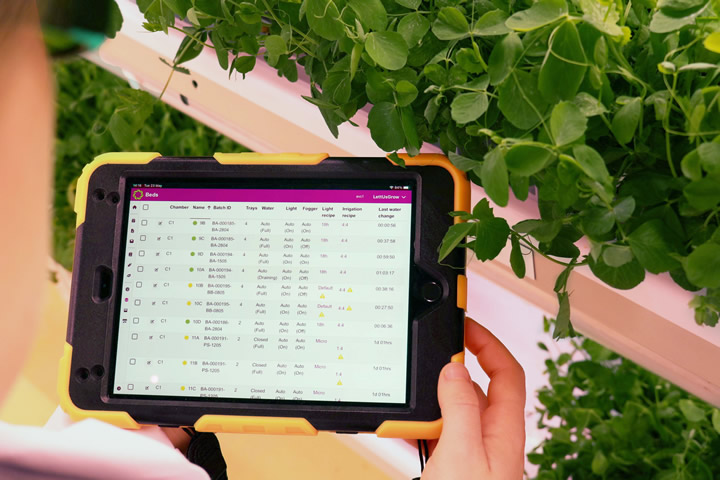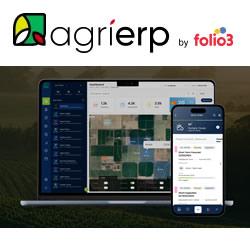Innovate UK backs collaborative project linking AI with automation & control to improve indoor farming sustainability

A pioneering project led by LettUs Grow - in collaboration with Fotenix, Rothamsted Research, CHAP, and Vertically Urban - is set to revolutionise the Total Controlled Environment Agriculture (TCEA) landscape in the UK. The Advanced Crop Dynamic Control (ACDC) project aims to develop highly energy-efficient and sustainable indoor farming systems through image-based analysis, AI and software that optimises the growing environment based on plant health and dynamic market environments.
Innovate UK has announced its support for this nearly million pound project, recognising its potential to transform TCEA operations into sustainable, energy-efficient crop growing systems, awarding £757,151 in funding from the Novel Low Emission Food Production Systems competition.
The project's core objective is to tackle the inefficiencies prevalent in TCEA by leveraging innovative technologies and methodologies - thereby improving energy efficiency.
Energy is one of the largest operational costs for TCEA but it’s not just a question of cost; it’s also one of sustainability. Choosing the right energy source and improving energy efficiency is crucial to reducing emissions.
By combining expertise from diverse fields, the consortium aims to pioneer novel TCEA growing methods that optimise environmental control efficiencies, encompassing lighting, irrigation, and nutrient supply. These improvements seek to address significant contributors to the carbon footprint within TCEA.
An integral aspect of this initiative is the automation of manual operations, coupled with the enhancement of produce safety, consistency, quality, and shelf-life for both retailers and consumers. This will be achieved by dynamically adjusting the growth environment, ushering in a new era of responsive TCEA technology.
Unprecedented in its approach, the project will utilise an integrated spectral imaging system coupled with an AI-based plant screening technology, designed by Fotenix, to measure crop physiological status. Fotenix CEO, Charles Veys, said: “Farms use our cameras to detect pest and disease, so why not use this to follow recipe evolution across economy or premium recipes? This project will fast-track collaboration between key suppliers into an industry-ready package at such a pivotal time for energy and food security.”
This data will inform illumination intensity, composition, and energy management, with a focus on integrating renewable energy sources - all of which will be controlled by the software platform, Ostara - originally developed by LettUs Grow. By prioritising plant health, the project aims to devise greener production recipes using advanced responsive control methodologies.
Adam Waterman, Chief Technical Officer of Ostara said: “It’s exciting to see how Ostara can be used as the gateway linking AI to farming systems. Because Ostara seamlessly plugs into farming controls - interfacing with lighting, irrigation, fertigation and environment systems - when sensors detect plant stress, Ostara has the potential to utilise Fotenix’s AI data to dynamically adjust controls to align plant health with energy-usage”.
Spinach, a high-protein leaf crop, holds a pivotal role in this project. Not only will it serve as a test crop to validate the integrated TCEA technology, but it also represents an alternative protein source poised to unlock new markets.
The project's impact will be rigorously assessed by evaluating changes in crop yield against operational benchmarks, considering cost-benefit analyses and comparing outcomes against existing industry standards.
Dr Harry Langford, Innovation Network Lead at CHAP said: “Systems-level integration of novel technologies capitalises on the UK’s strengths in TCEA and delivers turn-key solutions with global market appeal, so it is excellent to have been able to secure funding for this exciting project. As well as collaborating on development work, CHAP will conduct demonstration trials within our Vertical Farming Development Centre, to engage and exchange knowledge with the sector around the operational efficiencies achieved, and the potential to deliver on Net Zero.”
The consortium spearheading this initiative, comprises LettUs Grow, alongside two technology companies—Fotenix and Vertically Urban. Collaborating with them are notable research institutes: CHAP (a Research Technology Organisation), and Rothamsted Research (an academic partner).
Commenting on this collaboration, the consortium's partners expressed their enthusiasm for the project's potential to significantly reshape sustainable agriculture practices in the UK. They emphasised their commitment to driving innovation that not only addresses food security challenges but also contributes to a more environmentally conscious and economically viable future for TCEA.
“Vertically Urban is thrilled to be collaborating with leading CEA technology companies in the UK, and I am eagerly anticipating the outcomes of our endeavours” expressed Dr. Phoebe Sutton, Plant Scientist at Vertically Urban.
She elaborated, stating, “This project will unlock the efficient versatility of our Tunable luminaires by integrating seamlessly with the intelligent control features offered by Ostara and Fotenix. This synergy will result in substantial advancements in both energy efficiency and yield for an important crop.”
“Rothamsted Research is looking forward to working with partners to develop energy efficient , sustainable indoor farming systems. The integration of image-based analysis and AI to optimise the growing environment will help to optimise the growing conditions, whilst reducing the energy requirements, crucial to lowering UK emissions. Further, linking metabolite data from the plants will allow an integrated evaluation of the plants health and nutritional status.” said Dr Jane Ward, Principal Research Scientist at Rothamsted Research.
Innovate UK's support underscores the critical importance of such initiatives in fostering innovation and resilience in the face of complex global challenges.
Comments (0)
This post does not have any comments. Be the first to leave a comment below.
Featured Product

